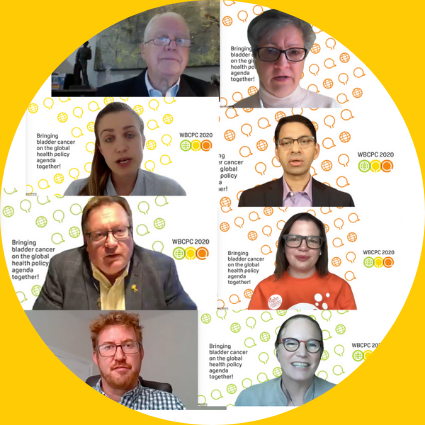Hacia un tratamiento óptimo para el cáncer de vejiga: cómo la búsqueda de datos se relaciona con la defensa para mejorar los resultados de la investigación
“
***This article is the second of a two-article series which summarises the experiences shared at the WBCPC 2020 Virtual Annual Meeting.
How advocacy helps progress bladder cancer research in the US: an example for inspiration?
Even as the voice of bladder cancer patients is under-represented in many countries today, Dr Stephanie Chisolm, Director of Education and Research, Bladder Cancer Advocacy Network (BCAN), says that science and pharmaceutical innovation to control the disease have progressed steadily since 1900 – and patient perspectives have been present along this entire pathway.
Her overview charted the evolution of bladder cancer care – from discovering the link between Schistosomiasis and urinary bladder cancer in 1911, to the first chemotherapy drug in the 1970s and today’s immune combination and targeted gene therapies.
Thanks to the efforts of US advocacy groups, she says that bladder cancer is now becoming recognised by science funders and public health policymakers. Despite this she sees much room for improvement to involve and reach more patients. She explains: “Some 1200 bladder cancer trials are listed in the Centers for Disease Control database, but only 3% of the eligible population engage in clinical trials. This means that it’s difficult to have enough patients to see scientific significance.” Also, bladder cancer is now listed as a priority topic for federal research funding – the result of advocacy efforts by BCAN and partners.
Innovative new therapies and diagnostic tools have the potential to change the treatment landscape. “It’s our role to ensure that they are available, accessible and affordable to our patient community,” she stresses. Looking at availability even with long-existing treatments, one example is BCG medicine – effective for many non-muscle-invasive bladder cancers, but is in an increasingly short supply. BCAN is advocating with producers and the regulators to encourage prompt approval of other strains and look at accessibility of alternative treatment options.
Patient involvement in cancer research: what does it mean?
Henry Scowcroft is a consumer member of the Bladder and Renal Group and the UK National Cancer Research Institute. He concluded the Annual Meeting by sharing his personal story of his partner’s fatal bladder cancer journey and how this motivated him to learn more about the disease.
Exploring the UK’s bladder cancer research landscape, he finds that there are talented scientists doing important work. But it is a fragmented community, with little coordinated research. “My investigation finds that, compared to what is happening for other cancers, we can do much more to improve our understanding of bladder cancers. Today much remains unknown about the biology and behaviour of bladder cancers.”
In this light, he explains that patients can make important contributions to improve the quality of cancer research, and this goes beyond participation in clinical trials. ‘Patient involvement’ is typically seen as participating in clinical trials. It is actually much more than that. “As the current research base for bladder cancers is not deep, we need more data on the tumour types and how they how behave. Here, patients can make an important contribution to improve the quality of this science by donating tissue. Bladder cancer research has a real lack of tissue and blood samples that are needed for research to progress.”
Here, he sees a big opportunity for patient advocacy to be a catalyst for enriching bladder cancer research. “My interest is to mobilize patients’ voices to bring together the academic laboratory community with clinical trials. I would like to see a world where everyone with bladder cancer can share their experiences to improve the understanding of the disease and the quality of research data. This is how we will make the world a better place for bladder cancer patients,” he says.
“Patient advocacy is at its weakest when the patient voice is at the second step – where the research community develops the hypotheses and brings it to us. Patients perspectives are most powerful when we are in the room, involved in the discussion when the research is being designed,” he says.
The World Bladder Cancer Patient Coalition gratefully acknowledges the support of our premier partners Ferring, Astellas, SeaGen and our sponsors AstraZeneca, Bayer, Bristol Myers Squibb, Merck, Pfizer, Roche.
“



